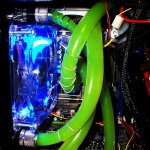Optimizing your computer for noise and performance
This may be useful for anyone who assembles a new PC. After I finished my recent build, I noticed that it was way too noisy under load (when playing Witcher 2 in Wine). The critical part was the power supply - Thermaltake Toughpower Grand 650W. It sounded like a taking off jet and was really annoying. Some people had a similar experience: https://youtube.com/watch?v=P3F5imJkGrU&t=33s
I looked for better confirmed silent PSUs and found that Seasonic is very reputable for that. So I got Seasonic Platinum 760W, and it makes a huge difference. It has a hybrid mode - fanless under low load, silent under medium load and cooling under high load. So far with Witcher 2 running it remained very silent.
This may be useful for anyone who assembles a new PC. After I finished my recent build, I noticed that it was way too noisy under load (when playing Witcher 2 in Wine). The critical part was the power supply - Thermaltake Toughpower Grand 650W. It sounded like a taking off jet and was really annoying. Some people had a similar experience: https://youtube.com/watch?v=P3F5imJkGrU&t=33s
I looked for better confirmed silent PSUs and found that Seasonic is very reputable for that. So I got Seasonic Platinum 760W, and it makes a huge difference. It has a hybrid mode - fanless under low load, silent under medium load and cooling under high load. So far with Witcher 2 running it remained very silent.
Last edited:





